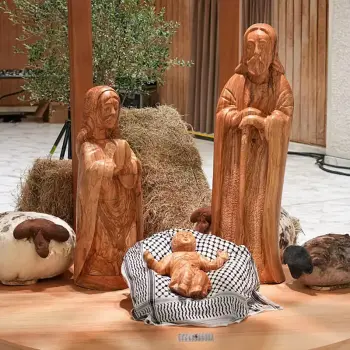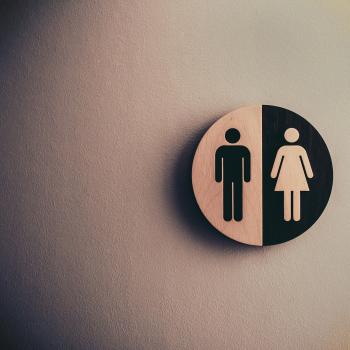One of the great philosophers in the Western tradition, Aristotle, famously called humans “political animals.” The broad idea behind this term is that humans naturally associate with each other. We form families, make friends, and experience conflict and enmity. Being political isn’t just for rulers and politicians. To be human is to be political.
Aside from Aristotle, there is a biblical foundation for this view. Not only are we political animals; we are political animals from the Garden of Eden. As we’ll see, God created us to be in political relationship with each other. Ideally, these relationships should be ordered by justice, truth, righteousness, faith, hope, and love.
However, because of the Fall, we live in a deep and difficult tension as political animals. Politics is no longer an idealistic practice. It is flawed and tainted. Yet even though it is tainted, the promise of who God has created us to be, and the promise of what creation is intended to be, offers us hope, even when things go wrong.
Is it Good for Man to be Alone?

The first book of the Bible gives us what scholars call a “cosmology.” Cosmos is a Greek word, essentially meaning “universe” or the “totality of all that is.” The suffix “-ology,” of course, comes from the Greek word logos, which means “word” or “reason.” A cosmology is often understood by scholars of religion as a broad, sweeping history of everything. It is a grand narrative that makes everything make sense. Cosmologies help us understand who we are and where we came from. This is what we find in the book of Genesis.
Genesis 2 gives us a story of creation very much focused on human beings. (We will not address here the question of whether there are two creation stories or one in Genesis 1-3. This BioLogos article will be helpful to those interested in that debate.) In Genesis 2, God creates Adam from the dust (the Hebrew adam [man] plays on the word for dust [Heb., adamah]). Then, God plants Eden and places Adam there to “work it and keep it” (Gen. 2:15, ESV).
God remarks that it is not good that Adam is all by himself. Animals of various sorts are brought to Adam to be named. But no animal was like Adam. So God puts Adam to sleep, and from his rib, creates Eve. It is when Adam wakes up and sees Eve that we get the very first poem of the Bible.
This at last is bone of my bones
and flesh of my flesh;
she shall be called Woman,
because she was taken out of Man (Gen. 2:23)
Political Animals: We were Made for Each Other

This poem is often spoken of as a love song. And it is. But it is also a song of fulfillment. A better word might be completion. When Adam says that Eve is the flesh of his flesh, he is saying, “She is like me! I am no longer alone!”
And let us remember that Adam was in paradise. He lived in a garden planted by God Himself. But he was alone. There was no animal like the Adam animal. This point in the story does not seem to be gender-specific. If Eve were created first, she would be all alone until God made her a companion, too.
Of all the attempts to find out what makes humans different from the other animals, Genesis 2 gives us a strong clue as to what that might be. Humans are political animals from the Garden of Eden. We were created like all the other animals were, but we were the only animals who started out lonely. This seems to highlight the reality that God made us to be with animals like ourselves.
The lesson here is that when we are together, we are complete. By ourselves, even if we are in a garden with the creator of the universe, we are lonely. I think that we make a mistake when we focus only on our personal relationships with God. God didn’t just make us to enjoy Him. He made us to enjoy the company of each other! God has a high view of what human politics (in the sense of life lived with others) should be.
Sin’s Effects on Human Politics

Sadly, the story did not stop there. Eve and then Adam, taking the advice of a walking, talking snake, took the forbidden fruit. Maybe they wanted to become like God. Perhaps they felt rebellious. Or maybe they were innocently curious. But it happened. And their choice had cosmological consequences.
If we think of Adam and Eve as the first political association, then the Fall teaches us about the nature of all politics in subsequent history.
The Fall brought curses on both the man and the woman. Eve was cursed with painful childbirth and a desire to go against her husband despite his rule over her. Adam was cursed with painful and often fruitless labor, and had to push himself to his limits just for sustenance (see Gen. 2:16-19).
Many have pointed to this part of the story to justify men having more power or privilege than women, or to justify the grueling conditions that the poor are often forced to work in. But it does not seem that God was prescribing these inequalities and sufferings to Adam and Eve. Rather, God was describing the consequences of life under sin. When we live selfishly and not for each other and for God, that is when we subjugate each other, and when power is abused.
Politics East of Eden

So human politics had its fall. The very first human relationship failed because they failed to follow the one command they had been given. And we should remember that the very first act of violence soon followed with the very next generation: Cain’s murder of his brother, Abel.
Today, we find ourselves living in a very strong tension. We are political animals from the Garden of Eden. Outside the garden wall, we experience a mixture of love and hate, hope and despair, shame and glory.
Therefore, faithful politics is somewhat of a balancing act. There are those who practice politics as though humans are fundamentally good. This sort of politics is very lenient and forgiving. In family life, this can look like forgiving a family member who continues to threaten the cohesion of the broader family, even though that person keeps messing up again and again. In national life, perhaps it looks like forming alliances with other nations, even if they have had histories of turning on their allies.
There are also those whose political practice assumes that humans are fundamentally evil. This politics is one of control and punishment. In a family, this can look like a distrustful father who controls every thing his children do. He cannot trust them, and he perhaps does not trust himself. Nationally, this looks like governments invading their people’s privacy, or incarcerating certain people groups because they are assumed to be especially lawless or criminal.
Faithful politics, different from the two types of politics discussed above, must strike a balance between the two aspects of human nature. Humans are neither fundamentally good, nor fundamentally bad. Rather, they are made in God’s image and they are sinful by nature. We must navigate the complexities of who we are.
Conclusion: Political Animals from the Garden of Eden
Striking a balance in how we think about human nature is absolutely essential to how we practice politics. Humans are political animals, but what exactly does that mean? And how should societies and relationships be structured in light of that?
The first step would be to listen. Listening is absolutely essential. How can you build a common life with others if you don’t know who those others are? How can a pastor build a healthy church community if he has never met his congregants? Or how can a politician decide legislation if she does not know what the people want? We must listen to each other.
Second, after listening, we should dispel our preconceptions about each other. In our historical moment, this means allowing people to speak for themselves about who they are and what they want. Far too often in our history, we have let the economic status, skin color, religious affiliation, or political opinions of other people determine how we relate and respond to them. This is unwise.
Third, we must learn to balance ideals with pragmatism. God has made creation to be in perfect harmony with Him and within itself. But the reality is that creation is tainted with sin. We cannot be totally idealistic, expecting everything about our relationships or nations to be unproblematic or perfect. This will never happen. But we also cannot allow ourselves to be defeatists, because that is where we become complacent when we see that our societies are structured wrongly or unjustly, or when we see a dying person on the side of the road that only a Good Samaritan would help.
We are political animals from the Garden of Eden. And now that we know who we are, who shall we become?













